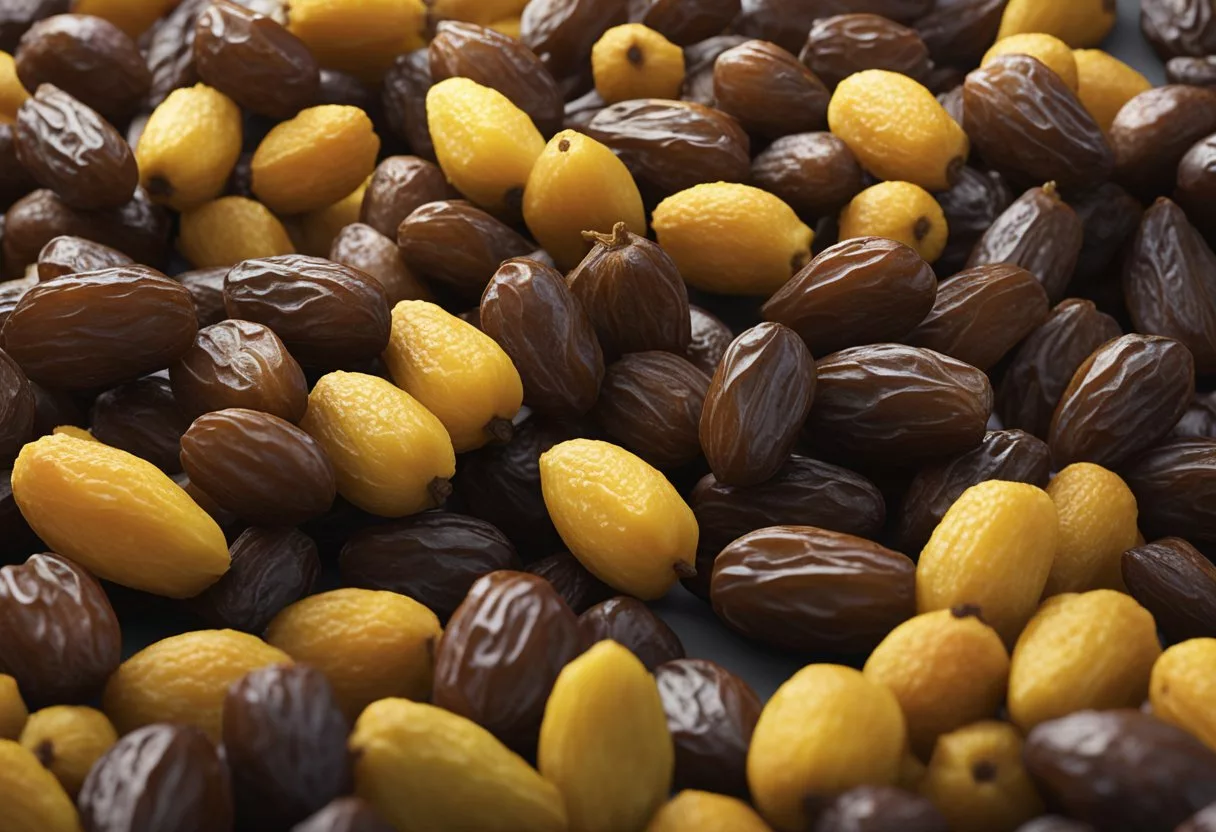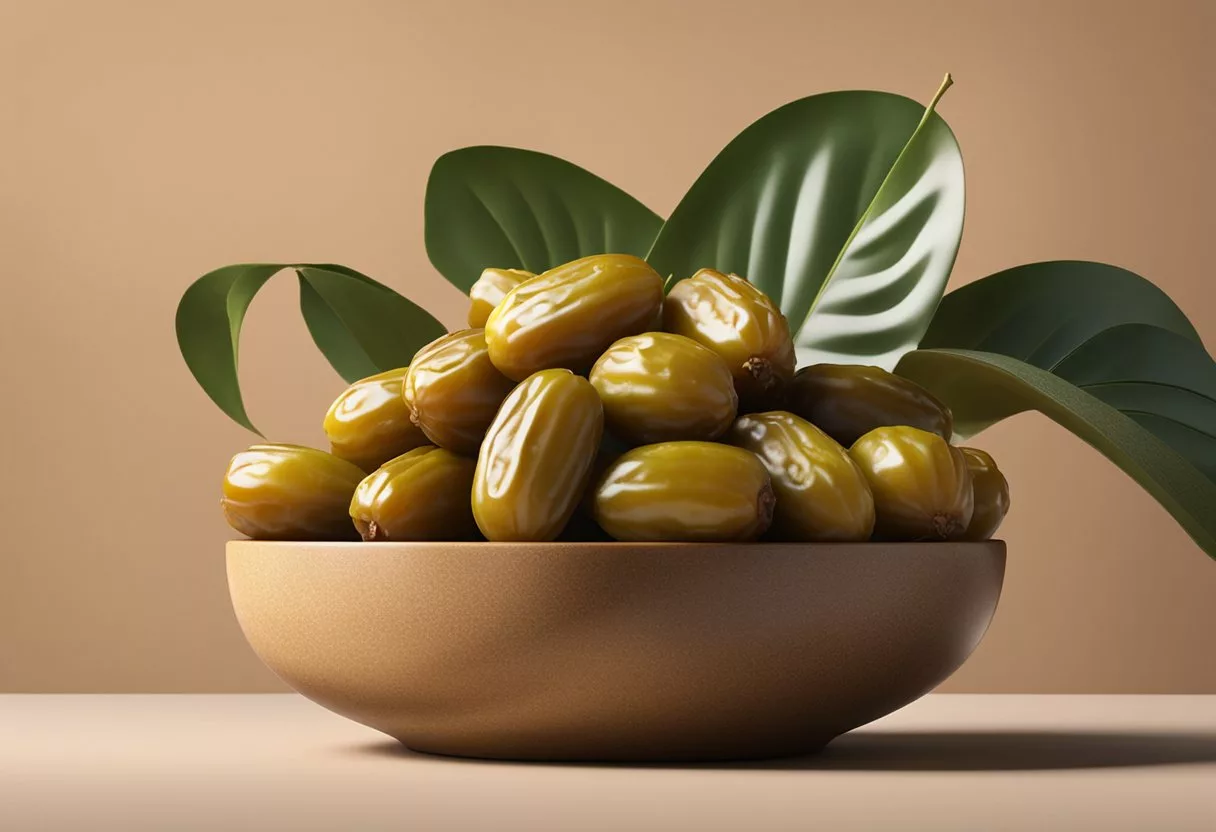Dates, the sweet and chewy fruits of the date palm tree, are not just tasty treats but also nutritional powerhouses. Packed with natural sugars, fiber, and essential minerals like potassium, dates offer a wide array of health benefits. These fruits are known for boosting brain health, aiding digestion, and promoting natural labor in expectant mothers, making them a versatile addition to any diet.
In addition to their health perks, dates have been cherished for centuries in the Middle East, especially during Ramadan. Their rich history and cultural significance add to their appeal. Modern research has found that dates can support brain health and help the body store energy efficiently, which is crucial for many daily activities and bodily functions.
Whether eaten on their own, added to a smoothie, or used in sweet and savory dishes, dates are a delicious way to enhance your nutrient intake. They are also a great alternative to refined sugars, providing a healthier option for those looking to satisfy their sweet tooth.
Key Takeaways
- Dates are rich in natural sugars, fiber, and essential minerals.
- They boost brain health and aid digestion.
- Dates have significant cultural importance and versatile culinary uses.
Historical Significance

Dates have played a crucial role in the development of many ancient civilizations, particularly in the Middle East and North Africa. The fruit is deeply embedded in cultural, religious, and medicinal practices.
Origination and Cultivation
The date palm tree, known scientifically as Phoenix dactylifera, likely originated in the region around Iraq and has been cultivated for over 6,000 years. Ancient civilizations, including the Mesopotamians and Egyptians, valued dates for their nutritional benefits and ease of storage.
From Iraq, date cultivation spread across the Middle East and North Africa. The fertile lands along the Nile River and oases in the Arabian Peninsula became prime areas for growing these trees. As a cornerstone of agriculture in these regions, the date palm was crucial for sustaining large populations.
Traditional Medicine and Uses
In ancient times, dates were not only a food source but also an important component of traditional medicine. The fruit was used to treat a variety of ailments, from digestive issues to fever. Texts from ancient Egypt and Mesopotamia mention dates in recipes for medicinal concoctions.
In Islamic culture, dates hold religious significance. The Prophet Muhammad encouraged breaking fasts with dates, and they are frequently mentioned in the Quran. This has perpetuated their status as a symbol of health and well-being in Muslim communities.
The versatility of dates meant they were also used in making syrups, wines, and vinegar. Different parts of the date palm, like leaves and seeds, served multiple purposes, from crafting to fuel, contributing to the economy and daily life of people in the Middle East and North Africa.
Nutritional Profile
Dates are packed with essential nutrients that offer various health benefits. They provide a good mix of macronutrients, vitamins, minerals, and phytonutrients that contribute to their overall nutritional value.
Macronutrients
Dates are a rich source of carbohydrates, primarily in the form of natural sugars like glucose, fructose, and sucrose. One date (around 8 grams) provides roughly 23 calories and 6 grams of carbohydrates. While they contain almost no fat, they do offer a small amount of protein—around 0.2 grams per date. The high carbohydrate content makes dates an energy-dense fruit, useful for quick energy boosts.
Dates are also high in dietary fiber. A quarter cup of dates provides about 12% of the daily fiber requirement. This fiber aids in digestion and helps maintain a healthy gut.
Vitamins and Minerals
Dates are rich in several important vitamins and minerals. They are a good source of potassium, magnesium, and iron. Magnesium supports muscle function and nerve function while iron is crucial for blood production.
They also contain significant amounts of vitamin B6 and vitamin C. Vitamin B6 helps with brain development and function, and vitamin C boosts the immune system.
Other essential minerals found in dates include copper, calcium, manganese, zinc, and selenium. Copper helps form red blood cells, calcium is vital for bone health, and selenium acts as an antioxidant.
Phytonutrients
Dates are rich in antioxidants, which are phytonutrients that help protect cells from damage. These include flavonoids, carotenoids, and phenolic acid.
The antioxidants in dates may help reduce inflammation and support heart health. Flavonoids are known for their anti-inflammatory properties, while carotenoids promote eye health. Phenolic acid also has anti-inflammatory and potential anti-cancer properties.
By consuming dates, the body benefits from these protective compounds, which may contribute to overall well-being. Dates have a sweet flavor but are nutrient-dense, making them a healthy addition to many diets.
Health Benefits

Dates are nutritious fruits with numerous health benefits. They support cardiovascular and digestive health, aid in weight management, and have potential benefits during pregnancy and labor. They are also rich in antioxidants and nutrients which may help in cancer prevention and cognitive functions.
Digestive Health
Dates are high in fiber, which is essential for digestive health. The fiber content helps promote regular bowel movements and can prevent constipation. Eating dates can improve gut health by encouraging the growth of beneficial bacteria. Additionally, dates contain certain antioxidants and polyphenols, which can help reduce inflammation in the digestive tract, further contributing to better digestion and overall gut health.
Cardiovascular Support
Dates support heart health in various ways. They are rich in potassium, which helps regulate blood pressure. The high fiber content in dates can also help lower cholesterol levels, reducing the risk of heart disease. Antioxidants and polyphenols in dates are beneficial for reducing oxidative stress and inflammation, supporting overall cardiovascular and vascular health.
Diabetes Management
Despite being naturally sweet, dates have a low glycemic index, making them suitable for those managing diabetes. Consuming dates in moderation can provide energy without causing significant spikes in blood sugar levels. The presence of fiber in dates aids in blood sugar control, helping maintain stable glucose levels. This makes dates a healthier snack option for diabetics looking to manage their condition effectively.
Cancer Prevention
Dates are packed with antioxidants like carotenoids and polyphenols, which may help reduce the risk of certain cancers. These compounds combat oxidative stress and reduce inflammation, which are key factors in cancer development. By including dates in your diet, you can contribute to better protection against chronic diseases, such as cancer, enhancing overall health and longevity.
Pregnancy and Labor
Dates may benefit pregnant women, especially towards the end of their term. Studies suggest that consuming dates can help with cervical dilation and reduce the need for induced labor. This is partly due to their ability to increase the production of oxytocin, which facilitates natural labor. Dates also provide essential nutrients like iron and magnesium, supporting both mother and baby’s health during pregnancy.
Cognitive Functions
Dates have been shown to support brain health and cognitive functions. They contain antioxidants that help reduce inflammation and oxidative stress in the brain, factors linked to neurodegenerative diseases. Regular consumption of dates may help improve memory and reduce the buildup of amyloid beta proteins, which are associated with Alzheimer’s disease. This makes dates a beneficial food for maintaining cognitive health.
Bone Health
Dates are rich in minerals like phosphorus, potassium, calcium, and magnesium, which are crucial for maintaining strong and healthy bones. These minerals help improve bone density and prevent conditions like osteoporosis. Regular intake of dates can support overall bone health, making them an excellent addition to a diet aimed at maintaining or improving skeletal strength.
Weight Management
While dates are high in natural sugars, their fiber content can aid in weight management. Fiber helps you feel full longer, reducing overall calorie intake. Additionally, the natural sweetness of dates makes them a healthier alternative to sugary snacks and desserts. Moderation is key, as their high caloric content means they should be consumed as part of a balanced diet.
Culinary Uses

Dates are not only delicious but also incredibly versatile in the kitchen. From traditional dishes to modern culinary innovations, dates can be used in both sweet and savory recipes. Whether used fresh or dried, dates add natural sweetness and a rich texture.
Traditional Dishes
In many parts of the Middle East and North Africa, dates play a key role in traditional cuisine. They are often stuffed with nuts or nut butter and served as a sweet treat. Medjool dates, known for their large size and soft texture, are particularly popular for these dishes.
Dates are also used in tagines, a type of Moroccan stew, where they add a touch of sweetness to savory dishes. Another common use is in energy balls, combined with other dried fruits and nuts for a nutritious snack. Often found in religious or festive meal spreads, dates are an integral part of cultural culinary traditions.
Modern Culinary Innovations
In contemporary kitchens, dates have found their way into a variety of innovative recipes. They make an excellent natural sugar substitute in smoothies, providing sweetness without added sugars. Dates are also popular in baked goods like muffins, cakes, and oatmeal cookies, where they add moisture and sweetness.
In salads, dried dates pair well with ingredients like goat cheese and nuts, adding a unique flavor and texture. They also work well in savory dishes like roasted vegetables or meat glazes. For those looking to reduce sugar intake, dates are a perfect alternative, providing both prebiotics and essential nutrients.
By incorporating dates into modern recipes, chefs and home cooks alike can enjoy their unique flavor and health benefits.
Buying and Storage Tips

Keeping dates fresh and tasty starts with choosing the right ones and storing them properly. This will ensure they retain their flavor and nutritional benefits.
Selection and Freshness
When buying dates, look for Medjool dates or Deglet Noor dates. Medjool dates are large, plump, and often moister, making them ideal for snacking. Deglet Noor dates are smaller and have a firmer texture, suitable for cooking and baking.
Inspect the dates carefully. Fresh dates should have a smooth, glossy skin with no wrinkles or crystallized sugar on the outside. Avoid dates that appear dry, hard, or have any mold.
Dates often come in bulk bins or packaged. If buying in bulk, ensure they are covered to remain free from contaminants. If packaged, check the expiration date and choose the freshest batch available.
Storage Practices
To keep dates fresh, start by separating them based on their moisture content. High-moisture dates like Medjool need more attention compared to semi-dry dates like Deglet Noor.
For fresh dates you plan to consume within a few weeks, use the refrigerator. Place them in a plastic bag with small holes for air circulation, or use a produce drawer to regulate humidity.
To store dates longer, consider freezing them. Clean and dry the dates, remove any stems or pits, and place them in an airtight container or resealable freezer bags.
For semi-dry dates, storing at room temperature is fine. Keep them in a cool, dark place in a glass or plastic container. Make sure the container is airtight to prevent pests and moisture from ruining the dates.
Side Effects and Considerations

Eating dates can offer many benefits, but there are some side effects and considerations to keep in mind. This includes potential allergic reactions and managing the sugar content, especially for those with diabetes.
Allergic Reactions
Although rare, some people might experience allergic reactions to dates. Symptoms can include itching, swelling, and redness. In severe cases, individuals might experience shortness of breath or anaphylaxis.
It’s important to be aware that dates can also cross-react with latex. Individuals allergic to latex might experience similar allergic reactions when consuming dates. They should consult their healthcare provider before adding dates to their diet.
Monitoring for any signs of allergic reactions after eating dates can help in early detection and management. If any severe symptoms occur, seeking immediate medical attention is crucial.
Sugar Content and Diabetes
Dates are naturally high in sugars such as fructose and glucose. While these natural sugars are healthier than refined sugars, they can still impact blood sugar levels.
Individuals with diabetes need to manage their blood sugar levels carefully. Although dates have a lower glycemic index compared to refined sugar, eating too many dates can still cause blood sugar spikes.
A typical serving of dates (about four dates) contains significant natural sugars but also provides fiber, which helps slow sugar absorption. It’s always best to consume dates in moderation and consult with a healthcare provider to understand their impact on diabetes management.
Incorporating dates into a balanced diet while monitoring carbohydrate intake can ensure that the benefits of dates are enjoyed without negatively impacting blood sugar levels.
Comparison With Other Fruits

Dates offer a unique blend of nutrients and health benefits that set them apart from other fruits like prunes, figs, and apples. Here’s how dates compare in terms of nutritional content and overall health impact.
Nutritional Comparisons
When looking at the nutritional content, dates stand out for their high energy and mineral content. Dates are particularly rich in natural sugars, providing quick energy. They have a glycemic index ranging from 43 to 55, making them a moderate choice for blood sugar levels.
In contrast, prunes and figs are also rich in fiber and antioxidants but differ in other nutrients. Prunes are known for their high vitamin A and potassium levels, which are essential for eye health and blood pressure regulation. Figs, on the other hand, contain significant amounts of calcium and magnesium, crucial for bone health.
Here’s a quick comparison:
| Nutrient | Dates | Prunes | Figs |
|---|---|---|---|
| Fiber | 6.7g per 100g | 7.1g per 100g | 2.9g per 100g |
| Calories | 277 kcal per 100g | 240 kcal per 100g | 249 kcal per 100g |
| Natural Sugars | High | Moderate | Low |
Health Impact Comparisons
In terms of health benefits, dates offer a wide range of advantages. Dates help reduce the risk of chronic diseases due to their high levels of antioxidants and polyphenols, which fight inflammation and lower cholesterol.
Prunes are particularly effective for digestive health. They contain sorbitol, a natural laxative, and high fiber content, which aids in bowel regularity. Prunes also support heart health by improving cholesterol levels.
Figs contribute to heart and bone health with their high levels of calcium, magnesium, and phenolic acids. They also have a lower glycemic index compared to dates, which might make them a better option for people managing blood sugar levels. Figs are also rich in flavonoids, which help prevent oxidative stress.
By comparing these fruits, one can see that while each offers unique health benefits, dates provide a balanced mix of energy and essential minerals, making them a versatile addition to a healthy diet.
Environmental Impact and Sustainability

Growing and producing date fruits impacts the environment, particularly through farming methods and water resources. These factors are crucial in understanding how sustainable date production is.
Agricultural Practices
Date palms are usually grown in hot, arid regions like the Middle East and North Africa. The farming of date palms requires significant land. Traditional methods often involve clearing areas, which can lead to soil erosion and loss of biodiversity.
Most modern date farms rely on fertilizers and pesticides. These chemicals can pollute the soil and water if not managed properly. Switching to organic farming can help reduce these negative impacts.
Another issue is the transport of dates. Often, dates are shipped over long distances, contributing to carbon emissions. Local sourcing can mitigate this environmental cost.
Water Usage and Eco-Friendliness
Date production demands a lot of water. Since dates are grown in arid regions, water scarcity becomes a serious concern. Large amounts of groundwater or river water are diverted for irrigation, depleting these sources.
For instance, the global land, green water, and blue water footprint at the country scale from a production perspective are significant. In regions where fresh water is scarce, this massive water consumption can harm local ecosystems.
Using efficient irrigation systems like drip irrigation can help. These systems minimize water waste, making date farming more eco-friendly. Moreover, recycling water for irrigation can also reduce the environmental footprint of date production, boosting sustainability efforts.
Economic Significance

Dates have significant economic value due to their wide cultivation in regions like the Middle East and North Africa. They play a crucial role in global trade and have both cultural and economic importance in these areas.
Global Trade
Dates are a vital commodity in international markets. Major producers include countries in the Middle East and North Africa, such as Egypt, Saudi Arabia, and Iran. These regions have ideal climates for date palm trees, enabling them to supply a substantial portion of the global demand.
The date industry supports global trade by exporting millions of tons annually. Exporters benefit from high demand in Europe, Asia, and North America. The market for dates is expanding as more people realize their nutritional and health benefits, driving both consumption and trade volumes.
Key export markets:
- Europe
- Asia
- North America
The economic impact of this trade is significant, providing income for farmers and boosting the economies of producing countries. The trade not only supports local communities but also fosters international economic ties.
Cultural and Economic Role
Dates hold cultural and economic significance, especially in the Middle East and North Africa. They are a staple in many diets and are deeply integrated into various cultural traditions and religious practices.
In many regions, dates are associated with hospitality and are often offered to guests. They are also important during religious events such as Ramadan, where they are used to break fasts. This cultural importance keeps the demand for dates high, supporting local economies.
Economic roles:
- Provides livelihoods for farmers
- Boosts local economies
- Encourages agricultural advancements
Moreover, dates contribute to the agricultural sector by promoting sustainable farming practices. The cultivation of date palm trees not only supports food security but also advances local farming techniques and technologies, aiding overall agricultural growth.
The strong cultural ties and economic reliance on dates ensure they remain an essential crop, sustaining both economies and cultural heritage in key producing regions.
Frequently Asked Questions

Dates offer a range of health benefits, from boosting energy levels to supporting skin and sexual health. They are also beneficial for women and can be consumed daily in specific amounts.
What are the top health benefits of eating dates?
Dates are rich in antioxidants and contain vitamins and minerals like iron and vitamin B6. These nutrients help boost energy levels, promote heart health, and support digestive health. Dates are also known to help improve brain function.
How does the consumption of dates affect skin health?
Dates are high in antioxidants, which can protect the skin from damage caused by free radicals. They also contain vitamin C, which helps promote collagen production, making the skin look younger and healthier.
What are the benefits of consuming dates for sexual health?
Dates contain amino acids that can improve sexual stamina. They are also believed to increase libido and fertility by promoting the production of sex hormones.
In what ways can dates contribute to a woman’s health?
Dates are beneficial for women during pregnancy, as they can help ease labor by promoting cervical dilation. They also provide essential nutrients that support overall health and well-being, including magnesium, which is crucial for bone health.
How many dates are recommended for daily consumption?
It is generally recommended to consume 2-3 dates per day to reap their health benefits. This amount provides a good balance of nutrients without excessive sugar intake.
What are the potential side effects of eating dates?
While dates are nutritious, eating them in large quantities can lead to weight gain due to their high sugar content. They can also cause digestive issues like bloating and diarrhea in some people.